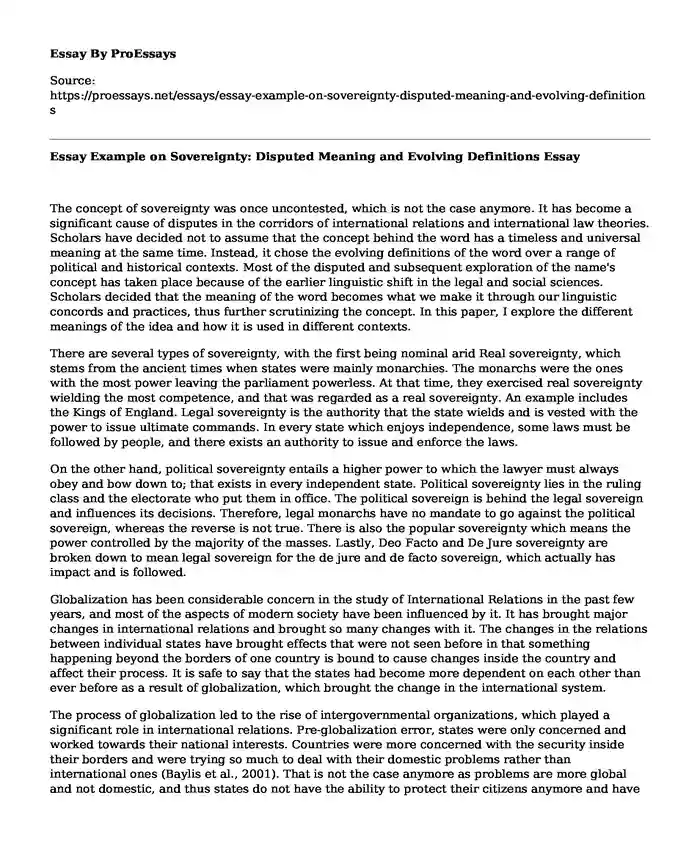The concept of sovereignty was once uncontested, which is not the case anymore. It has become a significant cause of disputes in the corridors of international relations and international law theories. Scholars have decided not to assume that the concept behind the word has a timeless and universal meaning at the same time. Instead, it chose the evolving definitions of the word over a range of political and historical contexts. Most of the disputed and subsequent exploration of the name's concept has taken place because of the earlier linguistic shift in the legal and social sciences. Scholars decided that the meaning of the word becomes what we make it through our linguistic concords and practices, thus further scrutinizing the concept. In this paper, I explore the different meanings of the idea and how it is used in different contexts.
There are several types of sovereignty, with the first being nominal arid Real sovereignty, which stems from the ancient times when states were mainly monarchies. The monarchs were the ones with the most power leaving the parliament powerless. At that time, they exercised real sovereignty wielding the most competence, and that was regarded as a real sovereignty. An example includes the Kings of England. Legal sovereignty is the authority that the state wields and is vested with the power to issue ultimate commands. In every state which enjoys independence, some laws must be followed by people, and there exists an authority to issue and enforce the laws.
On the other hand, political sovereignty entails a higher power to which the lawyer must always obey and bow down to; that exists in every independent state. Political sovereignty lies in the ruling class and the electorate who put them in office. The political sovereign is behind the legal sovereign and influences its decisions. Therefore, legal monarchs have no mandate to go against the political sovereign, whereas the reverse is not true. There is also the popular sovereignty which means the power controlled by the majority of the masses. Lastly, Deo Facto and De Jure sovereignty are broken down to mean legal sovereign for the de jure and de facto sovereign, which actually has impact and is followed.
Globalization has been considerable concern in the study of International Relations in the past few years, and most of the aspects of modern society have been influenced by it. It has brought major changes in international relations and brought so many changes with it. The changes in the relations between individual states have brought effects that were not seen before in that something happening beyond the borders of one country is bound to cause changes inside the country and affect their process. It is safe to say that the states had become more dependent on each other than ever before as a result of globalization, which brought the change in the international system.
The process of globalization led to the rise of intergovernmental organizations, which played a significant role in international relations. Pre-globalization error, states were only concerned and worked towards their national interests. Countries were more concerned with the security inside their borders and were trying so much to deal with their domestic problems rather than international ones (Baylis et al., 2001). That is not the case anymore as problems are more global and not domestic, and thus states do not have the ability to protect their citizens anymore and have to rely on help from intergovernmental organizations. Joining intergovernmental organizations by states makes them surrender some of their sovereignty. This is despite some of the decisions not being in the best interest of the country.
There is the domination of the Western agenda in these intergovernmental organizations, which denies some of the member countries their sovereignty. The aspect of the West rising only came about recently, and the formation of international relations has given them a forum to exercise their sovereignty muscles over other member countries. There are also accounts of international order which trace back their origin to Early modern Europe rather than Asia. Some rules governed the onset of wars, and Westphalia was one of them which declared when states could go to war. Several theories emerged that disputed its authenticity, citing reasons like its originality and its gains. The principle also set limits to the sovereignty rules established earlier by the 155 Peace of Augsburg.
Conclusion
The intergovernmental organizations have made it easier for economic interactions to take place, and infrastructural interactions are also taken care of. This sheds more light on the aspect of interdependence between countries as they rely on each other to move forward in terms of developments and other important decision making processes. Countries have lost their sovereignty to other countries that control those intergovernmental organizations through economic interactions and imperialism. It is safe to say that the meaning of sovereignty has changed and continues to evolve every day.
Reference
Baylis, John, and Smith, Steve (editors); The Globalization of World Politics – An introduction to international relations 2nd edition; (Oxford University Press, 2001)
Cite this page
Essay Example on Sovereignty: Disputed Meaning and Evolving Definitions. (2023, Sep 22). Retrieved from https://proessays.net/essays/essay-example-on-sovereignty-disputed-meaning-and-evolving-definitions
If you are the original author of this essay and no longer wish to have it published on the ProEssays website, please click below to request its removal:
- Unravelling the Arabian Culture
- Canada's Democracy: Stable Traditions, Varied Opinions, Political Parties - Essay Sample
- Federalism & Intergovernmental Relations: Evolving Order - Essay Sample
- Essay on Eliminating Poverty and Controlling Pollution: Fiscal Spending Objectives
- Democratic Party: Weakness or Strength? - Essay Sample
- Research Paper Example on Feminist Theory: Understanding Social Justice and Equality
- Navigating the Uncertainties of Global Trade Tariffs: Challenges, Risks, and Strategies - Free Report







